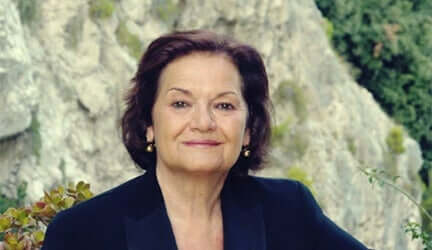Elisabeth Roudinesco is a French historian and psychoanalyst of great international prestige.
She is currently a researcher at the University of Paris VII Denis Diderot and one of the most recognized voices of contemporary psychoanalysis, as well as author of one of Sigmund Freud’s most beautiful and interesting biographies.
- High-class and the daughter of great intellectuals.
- Elisabeth Roudinesco graduated in Literature from sorbonne University.
He then did a master’s degree in linguistics and some courses with renowned authors of his time, such as Michel Foucault and Gilles Deleuze, and later did a PhD in literature.
“Are we then a historical situation – in which psychoanalysis offered the means to cure defeated or decentered subjectivity – to a globalized state in which the subject, transformed into a depressive, no longer wants to know what is happening in his unconscious? . -Elisabeth Roudinesco-
In 1969 he entered the Freudian school in Paris, founded by Jacques Lacan, where he stayed for 12 years and graduated as a psychoanalyst, has written several books and currently collaborates in the famous newspaper Le Monde de Paris.
One of the most interesting works by the psychoanalyst Elisabeth Roudinesco is the biography of Sigmund Freud Sigmund Freud in his time and in our time?And it is a long history, of great literary beauty, that has been awarded several times.
He stated that his intention was to make a balanced assessment of Freudian heritage, mainly because in recent decades the figure of the father of psychoanalysis has been caricatured.
The biography is not a pretence of Freud’s work, but a thorough investigation: Elisabeth Roudinesco explored several myths circulating around Freud’s figure and managed to establish the limits of his veracity, managed to contextualize the genesis of psychoanalysis and its historical significance.
Roudinesco manages to show psychoanalysis as one of the aspects of great intellectual boiling in Europe: feminism, surrealism and various approaches to anarchism were given at the same time as the advancement of knowledge about the unconscious.
Freud was not a lone genius, but one of the pillars of a very prolific historical moment.
For Elisabeth Roudinesco, one of Freud’s most important contributions was to have given everyone individual responsibility for his destiny, everyone must be the hero of his own life, be responsible for what happens to him and even what doesn’t happen to him.
On a psychoanalytic level, it is each individual who re-develops their history and makes sense of it.
This vision is diametrically opposed to what behavioralism proposes, which Elisabeth Roudinesco defines as “a very stupid technique, even if sometimes it works”.
It makes this statement taking into account the radicality of what is called “objective conduct” in this school, that is, observable or external, ignoring or minimizing the importance of unconscious phenomena.
Regarding the controversies over psychoanalysis, which some call “anti-scientific,” Roudinesco says this is not an easy theory to digest, as it ensures that in Freud’s time everything became psychic and that today everything has become organic.
She believes that in today’s world there are people who are suffering and want a pill to avoid that suffering, so psychiatrists have become distributors of medicines, but this model also shows signs of crisis.
For Elisabeth Roudinesco, psychoanalysis must also evolve in several respects, the first is to assume new realities, such as homo-infective families and sexual diversity.
He commented that some of his peers felt that gay-emotional families should not be formed because they threatened the Oedipus complex. To this, Roudinesco replies: “Then we have to change the Oedipus complex. “
She believes that this conservatism is not positive for a doctrine that has always been libertarian.
In addition, he believes that psychoanalysis should consider shorter interventions. The speed of the world is different.
Therefore, while retaining the basic option of performing analyzes that could take years, the alternative of shorter processes should also be presented. Elisabeth Roudinesco believes that it is possible to address a specific problem psychoanalytically, and not necessarily the entire life story.
Roudinesco does not believe that in these times there is more anxiety or mental problems than before, in his opinion what has changed is culture.
In Freud’s day, there was a great repression of discomfort, on the other hand, this discomfort is not only expressed openly, but is exposed and published, so it seems that today there are more problems, but that is not true.
Elisabeth Roudinesco is undoubtedly a psychoanalyst who has contributed greatly to the dissemination of her school, she is also a brilliant woman, who fears neither change nor self-criticism, an author who deserves to be read and analyzed.

